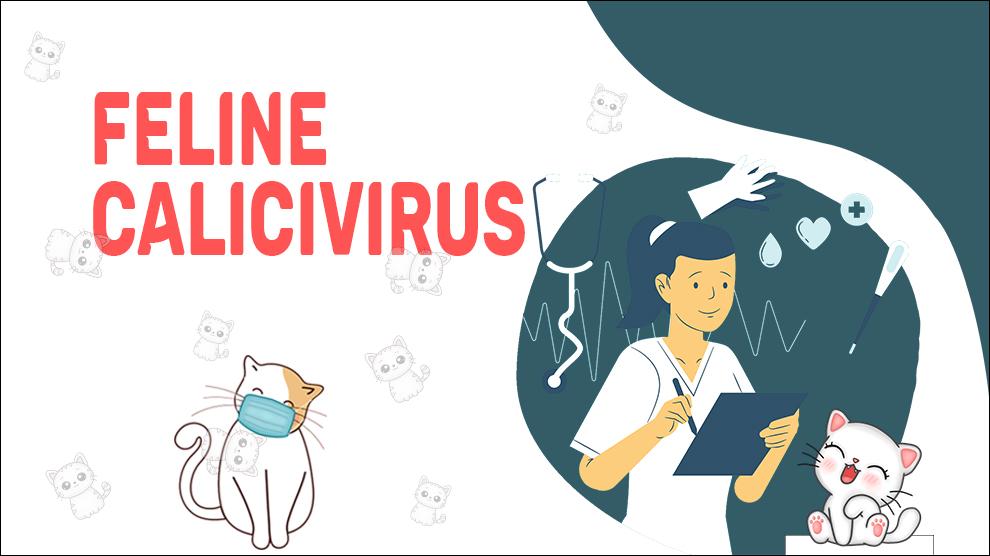What Is Feline Calicivirus?
Feline calicivirus (FCV) is a highly contagious viral infection that affects cats of all ages, genders, and breeds.
It is part of the respiratory disease complex, and the symptoms can vary from mild to severe.
FCV is a common cause of upper respiratory infections and can lead to other secondary bacterial infections.
Clinical Signs Of Feline Calicivirus
Symptoms of feline calicivirus can vary in severity and can include:
- Sneezing
- Coughing
- Runny nose
- Fever
- Ulcers in the mouth
- Drooling
- Conjunctivitis
- Limping syndrome
- Lameness
- Eyelid Inflammation
- Mucus Discharge In Eyes
- Enlarged Lymph Nodes
- Squinting In Eye
- Loss Of Skin Elasticity
- Sunken Eyes
- Pale Gums
- Limping
- Swelling Of Joints
- Swelling Of The Face
- Swelling Of The Legs
- Blood In Stool
- Bleeding In Nose
- Joint Pain
- Weight Loss
- Ulcer In Tongue
- Edema
Some cats may also experience anorexia, lethargy, and depression. The severity of the symptoms can depend on the cat's age, immune system, and overall health.
Treatment Options For Feline Calicivirus
There is no specific treatment for feline calicivirus, but supportive care can help manage the symptoms.
Treatment options may include:
- Antibiotics for secondary bacterial infections
- Antiviral medications
- Fluids to prevent dehydration
- Nutritional support
- Pain medication
- Steam therapy to help with breathing
Home Remedies For Feline Calicivirus
There are no specific home remedies for feline calicivirus, but supportive care can be given at home, such as providing a warm and comfortable environment, encouraging the cat to eat and drink, and keeping the cat's eyes and nose clear of discharge.
How To Prevent Feline Calicivirus?
Prevention of feline calicivirus involves good hygiene practices and vaccination.
Vaccines are available and are recommended for all cats, especially those that are at a higher risk for infection, such as cats in shelters or catteries.
Good hygiene practices include:
- Regular cleaning of food bowls and litter boxes
- Isolating infected cats
- Washing hands before and after handling cats
- Disinfecting contaminated surfaces
- Keeping cats in a clean and well-ventilated environment
Affected Cat Breeds Of Feline Calicivirus
Feline calicivirus can affect cats of any breed, age, or gender.
Causes For Feline Calicivirus
Causes:
Feline calicivirus is caused by a virus that is part of the family Caliciviridae.
The virus is highly contagious and can be spread through direct contact with an infected cat, or through indirect contact with contaminated objects like food bowls, litter boxes, or bedding.
The virus can survive in the environment for several days and is resistant to many disinfectants.
When To See A Vet For Feline Calicivirus?
If you suspect that your cat has feline calicivirus, it is important to contact your veterinarian.
They can perform a physical exam and run tests to determine if your cat has the virus.
They can also provide treatment options and help prevent the spread of the virus to other cats.
Food Suggestions For Feline Calicivirus
In some cases, cats with feline calicivirus may have a decreased appetite, so it is important to provide them with palatable and nutritious food.
Wet food or high-quality canned food can be more appealing to cats with decreased appetites.
Conclusion
Feline calicivirus is a common respiratory infection in cats that can cause a range of symptoms, from mild to severe.
Although there is no specific treatment for the virus itself, supportive care and prevention through vaccination can help manage and prevent infections.
Regular veterinary checkups and early treatment can also help prevent complications and ensure the best possible outcome for affected cats.











